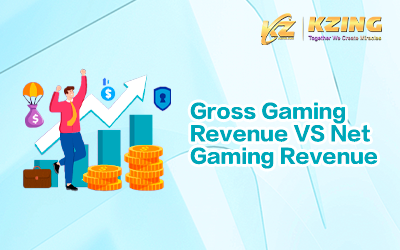

In the highly competitive gambling industry, financial metrics play a crucial role in gauging a company’s performance and guiding strategic decisions. Among these metrics, Gross Gaming Revenue (GGR) and Net Gaming Revenue (NGR) stand out as key indicators of financial health and operational efficiency. While they may seem similar, GGR and NGR offer distinct insights into the profitability and sustainability of a gaming business. This article aims to demystify these two important metrics by explaining their definitions, calculation methods, and differences. Additionally, it will provide strategies to improve both GGR and NGR, ensuring a comprehensive understanding of how these metrics impact the financial performance of gaming companies.
Table of Contents
Definition and Calculation of Gross Gaming Revenue (GGR)
Gross Gaming Revenue (GGR) is a fundamental measure in the gambling industry, representing the total amount wagered by players minus the winnings paid out to them. It reflects the amount of money that remains on the platform before any expenses are deducted.
Calculation Formula:
GGR = Total Amount Wagered − Total Winnings Paid to Players
GGR is a critical metric because it indicates the overall revenue generated from gaming activities, providing a snapshot of the platform’s gross income before accounting for operational costs.
Definition and Calculation of Net Gaming Revenue (NGR)
Net Gaming Revenue (NGR) is a more refined metric that takes into account various direct costs associated with generating gaming revenue. It provides a clearer picture of the actual profitability of the gaming operations by deducting expenses such as bonuses, promotions, gaming taxes, licensing fees, affiliate commissions and other miscellaneous costs from the GGR. Miscellaneous costs include other direct expenses related to operations that are directly attributable to generating gaming revenue.
Calculation Formula:
NGR = GGR − Bonuses and Promotions − Gaming Taxes − Licensing Fees − Affiliate Commissions − Other Miscellaneous Costs
NGR offers a more accurate measure of the net income derived from gaming activities, accounting for the essential costs of maintaining and growing the business.
Key Differences Between GGR and NGR
GGR represents the total amount of money that players wager on a gambling platform, minus any winnings. On the other hand, NGR refers to the actual revenue generated by the platform after deducting costs such as taxes, transaction fees, and bonuses.
How Can You Improve Your GGR and NGR?
Gross Gaming Revenue (GGR) and Net Gaming Revenue (NGR) are key metrics for assessing the financial performance of gaming companies. Here are some strategies to consider:
1. Optimize Game Offerings and Integrate Live Streamer
Game Variety: Ensure to provide a diverse range of games to cater to different player preferences and regularly update the game portfolio to keep players fresh and exciting. For instance, Kzing collaborates with over 100 game developers, offering more than 1000 game options to operators, ensuring there is something for every kind of player.
Game Quality: Invest in high quality game development such as engaging in graphics, sound, and seamless gameplay to enhance player satisfaction and retention.
Live Streaming Features: Incorporate live streaming options, especially for sports betting. Kzing white label integrates live streaming features for sports events which can significantly enhance your player experience and retention. Kzing offers a chance for your players to watch the live match while placing the bet at the same time.
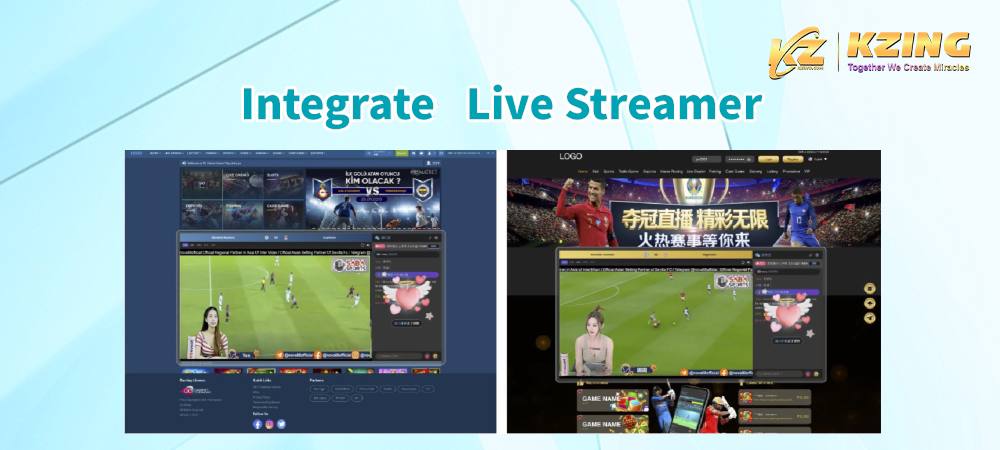
Keeping the game portfolio fresh and exciting is essential. Regular updates and the introduction of new games ensure that players always have something new to look forward to. By integrating popular sporting events and popular games into the platform, Kzing helps operators to enhance player engagement.
2. Enhance User Experience
Improving GGR and NGR can be effectively achieved by enhancing the user experience. Firstly, ensure that your platform and mobile app are fast and reliable, as players expect quick loading times and a smooth gaming experience. This can be done by regularly testing and optimizing your platform’s performance, including optimizing images, enabling browser caching, and minimizing the use of heavy scripts. Exceptional customer support is also crucial for building player trust and loyalty. Offering 24/7 customer support through various channels like live chat, email, and phone ensures players can have their concerns promptly addressed. Kzing, for example, provides round-the-clock technical support for operators, offering timely assistance for any issues that arise.
Moreover, secure and convenient payment options play a vital role in accommodating different player preferences. Whether through credit cards, e-wallets, or cryptocurrencies, Kzing offers tailored payment solutions, enabling operators to provide convenient options that resonate with their target audience. A smooth and efficient withdrawal process is important for maintaining player satisfaction and trust. Kzing Native APP seamless wallet feature that allows your players to automatic credit conversion offering them a hassle-free experience.
3. Increase Player Retention
Loyalty programs are a powerful tool for increasing player retention. Points, bonuses, and exclusive offers can significantly enhance player engagement. Kzing offers a well-structured loyalty system that allows operators to create tailored campaigns, ensuring players feel valued and appreciated. By leveraging data analytics to understand player preferences and behaviors, operators can provide personalized gaming experiences and promotions that resonate with individual players, enhancing player experience and increasing retention rates.
Attracting new players is essential for growth. Partnering with experts like Pixelated Marketing can optimize your marketing spend by focusing on social media channels that provide the highest return on investment, thereby improving brand awareness and drawing in new players. Additionally, word-of-mouth can be a powerful driver of new player acquisition. Encourage your existing players to refer new players by offering incentives such as bonuses or free play credits, further expanding your player base.
4. Leverage Technology
Artificial Intelligence (AI) and Machine Learning (ML) can analyze historical data to identify emerging trends and predict future gaming preferences. This enables operators to stay ahead of the competition by offering relevant and engaging content that resonates with players. While blockchain technology also offers unparalleled security and transparency, making it an ideal solution for online gaming transactions. By leveraging blockchain, operators can enhance player trust by ensuring the integrity and fairness of their gaming platforms.
Furthermore, with the proliferation of smartphones and tablets, mobile gaming has emerged as a dominant force in the industry. Kzing’s Native APP provides operators the tools and resources needed to deliver a seamless and immersive gaming experience to their mobile audience. By developing intuitive and responsive mobile gaming experiences, operators can attract and retain mobile users, driving both engagement and revenue.
Additionally, Kzing offers a Progressive Web App (PWA) solution, enabling operators to reach a wider audience with a web based application that functions like a native app. PWAs provide the benefits of quick installation, offline capabilities, and reduced data usage, ensuring users have a smooth and reliable gaming experience even in low-connectivity environments. By leveraging both Native APP and PWA technologies, operators can maximize their reach and enhance user satisfaction across diverse mobile platforms.
5. Monitor and Analyze Data
Performance Metrics: Regularly monitor key performance metrics to understand player behavior and identify areas for improvement. It allows you to make data-driven decisions to enhance player engagement and increase revenue. Key metrics to focus on include:
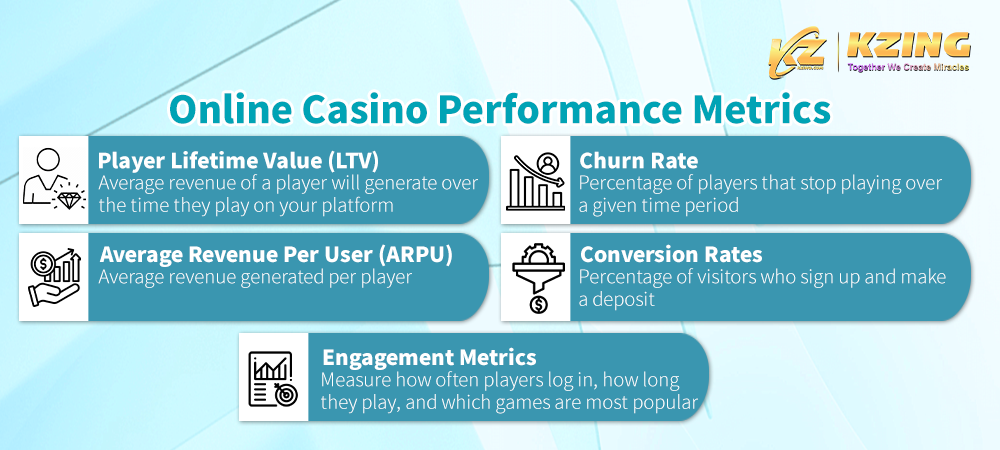
Feedback: Player feedback is invaluable for continuously improving the gaming experience. Establish robust feedback loops to collect and analyze player opinions and suggestions. For instance, monitor discussions and comments about your platform on social media platforms and community forums.
Security Measures: Fraud can significantly eat into your profits, making it essential to implement robust security measures. Kzing E2 Fraud and Compliance can help in this by providing advanced fraud detection and prevention mechanisms.
By regularly tracking performance metrics, collecting and analyzing player feedback, implementing robust security measures, and tailoring games and promotions to player behavior, you can significantly enhance your gaming platform’s profitability and player satisfaction.
Conclusion
In summary, understanding and effectively managing Gross Gaming Revenue (GGR) and Net Gaming Revenue (NGR) are critical for the success of any gaming company. By optimizing game offerings, enhancing user experience, increasing player retention, leveraging technology, and continuously monitoring and analyzing data, operators can improve both GGR and NGR, ensuring long-term growth and financial health.
Ready to launch successfully? Kzing white label provides everything you need. Contact us now to get started!
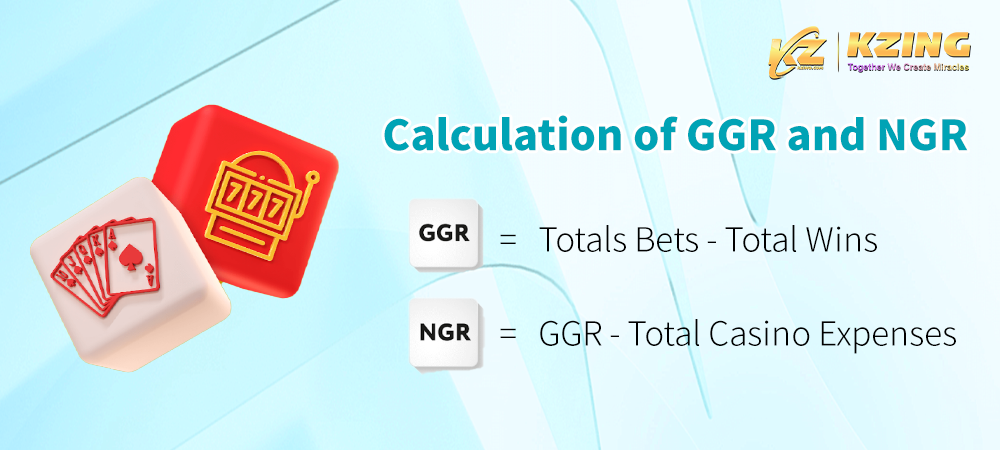
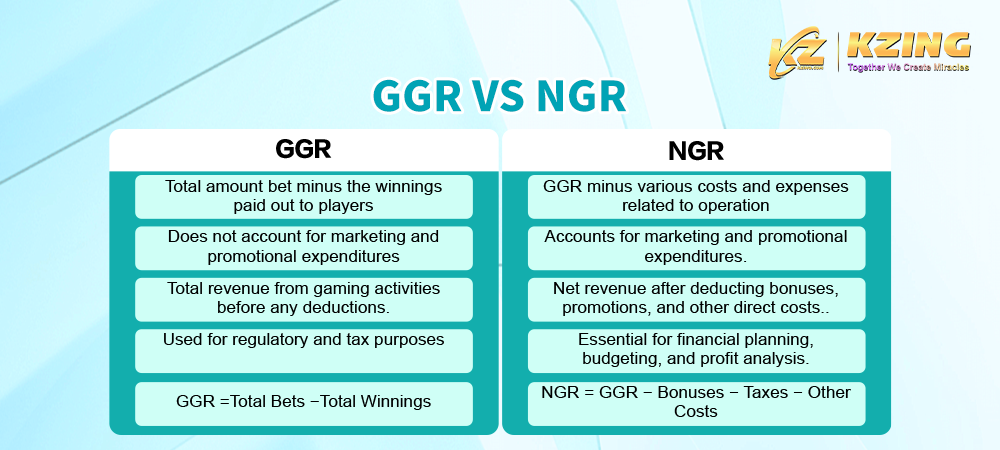
![Master the Metrics: Understanding Gross Gaming Revenue (GGR) Master_the_Metrics_Understanding_Gross_Gaming_Revenue_en_400x250[1]](https://www.kzing.co/wp-content/uploads/2024/04/Master_the_Metrics_Understanding_Gross_Gaming_Revenue_en_400x2501-150x150.png)
![Maximize Yield: Understanding Factors Affecting Gross Gaming Revenue (GGR) Maximize_Yield_Understanding_Factors_Affecting_Gross_Gaming_Revenue_en_400x250[1]](https://www.kzing.co/wp-content/uploads/2024/04/Maximize_Yield_Understanding_Factors_Affecting_Gross_Gaming_Revenue_en_400x2501-150x150.png)








